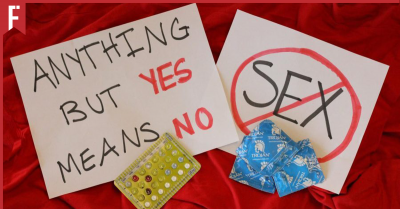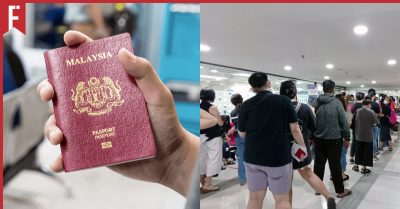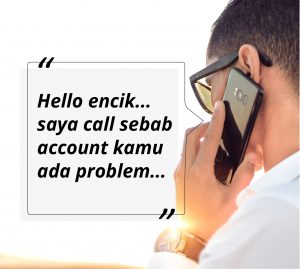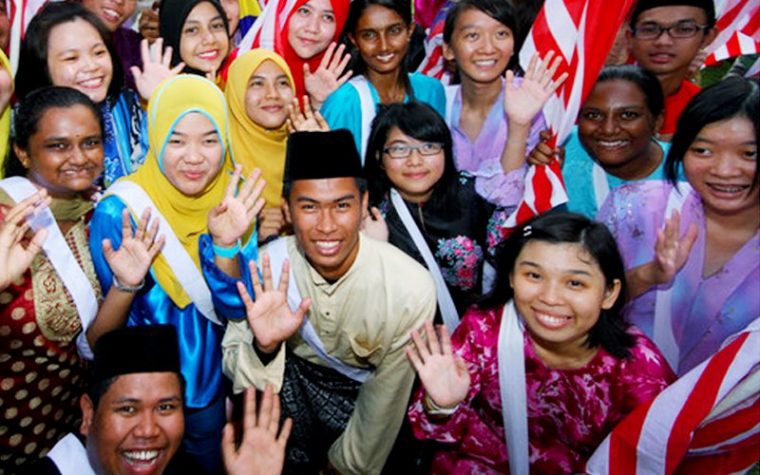
Let’s get this out of the way first: I’m not Indian, Chinese, or Malay. My mother’s Chinese, my father’s Indian, and my name, Zameen, sounds kinda Malay.
Needless to say, this has led to some… interesting scenarios as I grew up. If you’ve been to public school before, you can probably guess what everyone did during break time. The Chinese kids went to hang out with the other Chinese kids, the Indian kids went with the other Indians, and the Malays with the Malays.
And then there was me sitting in the middle, wondering where the heck I was supposed to go.
Things got better over time, but even now it is a very distinct memory. As Malaysians, we often claim to be friendly and open-minded, but the truth is that many of us do have some strong feelings about race – whether we consciously acknowledge it or not.
Sometimes Racism Can Be Subtle

I remember in one of my previous jobs we had meetings where half the people involved were happily talking and discussing business in Mandarin while the other half just sat there awkwardly waiting for someone to translate.
Doesn’t sound like a big deal, right? For those talking, it may not feel very important, but sidelining others like this causes people to feel frustrated or left out.
This particular act got a lot of attention last year due to a viral tweet from lawyer Lim Wei Jiet talking about how much he personally hated it when people speak their mother tongue in front of others who may not understand.
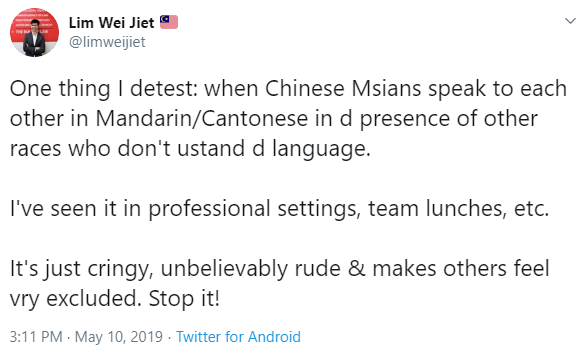
His tweet received a lot of attention, with many other Netizen replying with their own experiences. Since then, I’ve seen things improve a little bit – at the very least, people are more likely to call out such behaviour.
And Sometimes Racism is All-too-blatant
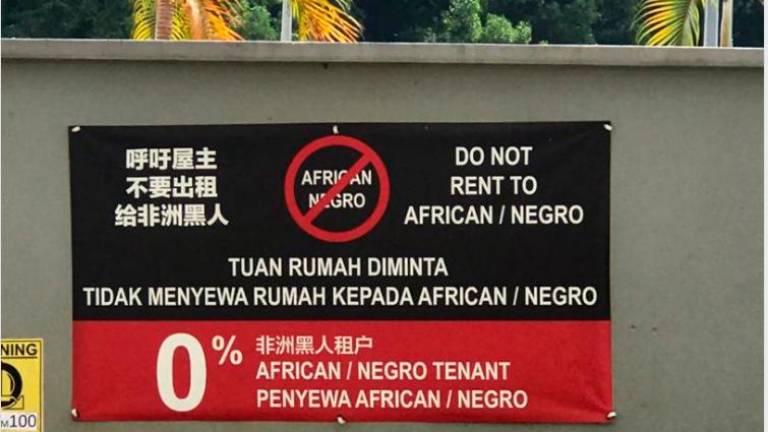
Back when I was in university, I remember one of my classmates, Sunny (not his real name), telling me how lucky I was.
Sunny was a black African, and he had first hand experience with how racist some Malaysians could be. “The people around here, they don’t want to see people like me,” he said. “When I try to get an apartment, they all say ‘not available’!”
I remember thinking he was exaggerating, that maybe he was just having trouble because he was a foreigner. But then a few years later I tried renting an apartment myself and realized that, if anything, he was downplaying it.
Anyone who’s had to look for a place to rent will have seen all the signs before: “Chinese only”, “Malay only”, “Indian only”… so what about all the people who aren’t in those categories? What about other Malaysian minorities such as Iban or Orang Asli? Are mixed-race people like myself just supposed to be homeless?
And yes, I’ve heard all the arguments about how this kind of behavior isn’t really racist: “Maybe the landlord wants someone who’s the same race/religion!”; “What if the landlord is just bad at speaking Chinese/Malay/Tamil and wants to be able to communicate with his tenants?” and, of course, the ever classy “It’s a personal matter! If I only want to rent to one race, that’s my business!”
But when you have someone putting up a big sign saying that they don’t rent to “negros”, I think it’s safe to say that racism is involved.
COVID-19 and Racism
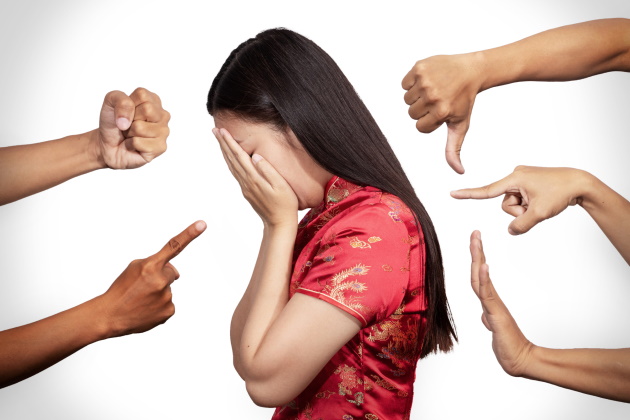
One of the bright sides of this COVID-19 pandemic? It’s made it much easier to spot any closet racists in your friend list.
My personal rule is to block anyone who posts racist garbage, including stuff like how the Chinese/Americans/Russians/Martians, etc. are secretly causing/controlling/spreading the virus.
Violent incidents of racism and hate crimes are thankfully rare in Malaysia, but the COVID-19 pandemic has caused tensions to rise on all sides. Over the past few months, there has been an increase in racist tweets, especially after incidents like the tabligh event or the Chinese doctor who was caught on video arguing with enforcement officers about jogging during MCO.
Making A Stand Against Racism
Despite all my complaints, it’s clear that not everyone has been content to sit back and accept the status quo. Though there is still a long way to go, we Malaysians have made many improvements over the years.
So how can we do our part to stop racism?
1) Report It
When you see or experience an incident of racism, don’t just accept it or let it slide. Report it to the relevant authorities, especially if it involves criminal behaviour such as physical harm, abuse, or provocative displays. If you feel unsafe, get away from the situation and inform the police as soon as you can.
You can also report racist incidents to Pusat KOMAS – a Malaysian human rights organization. They have been actively promoting equality and the elimination of all forms of racial discrimination in Malaysia with events and activities such as the #akubangsaMalaysia challenge.
2) Use Social Media Responsibly
Social media has all sorts of benefits – but it also comes with some unfortunate downsides, especially in recent times. The COVID-19 pandemic has caused an explosion of fake news all across the world. Sometimes, these viral messages can be funny – like that one video showing a ‘magic baby’ that claimed eating eggs would cure COVID-19. Other times, however, it can be all-too-serious.
Even before the MCO had started, Universiti Sains Malaysia psychologist and criminologist Associate Professor Dr Geshina Ayu Mat Saat warned that the COVID-19 outbreak could lead to a rise in xenophobia, especially against those of Chinese descent.
“One is the thought that since most of those who tested positive for Covid-19 are Chinese, therefore the Chinese are most vulnerable or most likely to be infected.”
Some of the biggest social media companies have taken steps to counteract fake news. For example, Facebook has set up extensive algorithms to flag false or sensationalist claims. While this is a good sign, normal social media users such as ourselves also have to play our parts. By using social media responsibly, we can help reduce racism across the nation.
3) Step Out of Your Bubble
One of the reasons why racism has taken root in our society is how everyone has become isolated in their own little ‘bubbles’. Earlier, I mentioned how all the kids in school would only hang out with people of the same race – Malay kids with the other Malays, Chinese with the other Chinese, and so on.
This is a bad sign for racial harmony. After all, if we spend all our time apart, how can we possibly hope to understand one another? If we limit all our social interaction to only one race, imagine how much we are missing. If we ever want to overcome racism, we must be willing to set aside these boundaries and make friends with people of all races.
So how can we change this? Well, one simple way is to simply interact and meet with new people. Just because we’re all practicing social distancing during MCO doesn’t mean that we can’t be social online. And once the MCO is over, there are all sorts of things you can do to meet new people; volunteer to help out a charity, sign up for a training class, join a book club… the options are endless!
Stepping out of your comfort zone can feel overwhelming at first, but learning to get along and befriend others will help you to understand their own culture and point of view.
Spread Love, Not Hate
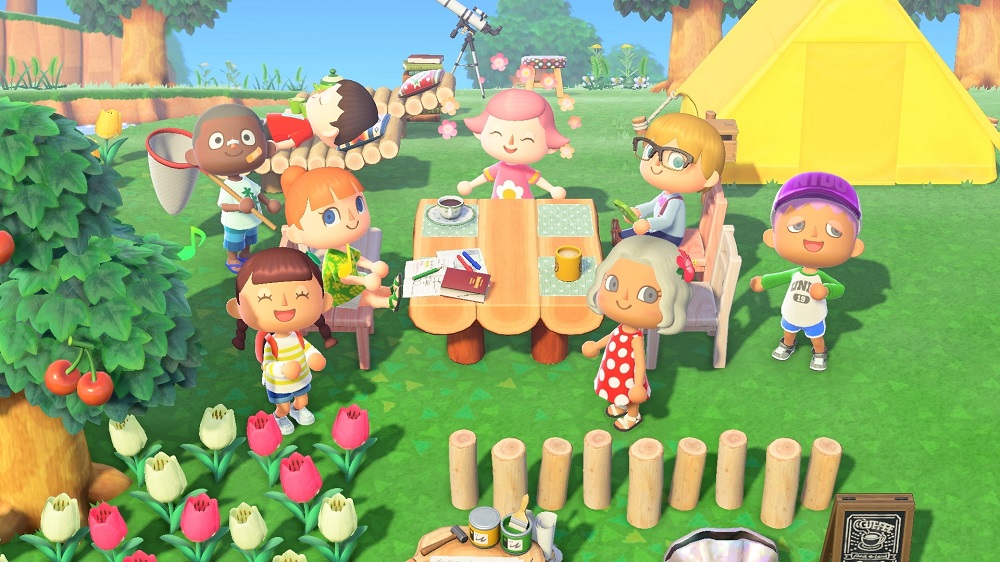
Today, things are tense. Everyone is too preoccupied with the MCO situation, leaving many people feeling lonely and stressed out. During this Raya season, let’s do what we can to make things better.
Reach out to your friends and loved ones and let them know that they’re not alone. Even a simple call can be enough to brighten up someone’s day.
If you’re worried about a loved one’s emotional health, click HERE to find out how you can help them to feel better. To stay informed on this topic, you can also follow our Twitter to keep up to date with all the latest news and events.



